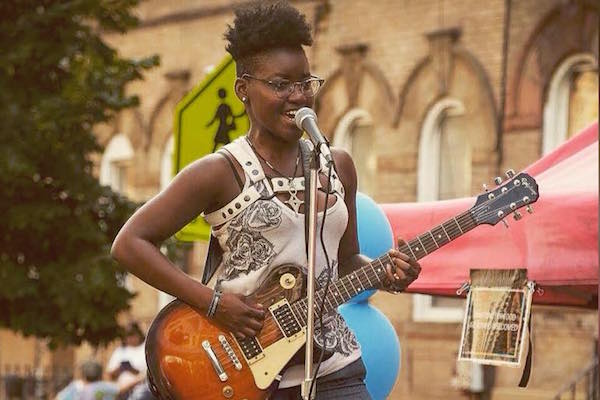Welcome to our series featuring LGBTQ artists from around the world. This issue we’re tipping our hats to Julie Outrage, a young artist hailing from Maryland. Born in West Africa, Outrage most identifies with alternative soul, funk rock, jazz, blues, human music and revolution music.
Who/what is your inspiration and why?
I find inspiration in literally everything. People I pass on the street, the way the sun streams through window shades; friends, love, media culture, loneliness, over stimulation, just everything in life really.
Why is music important to the queer community?
I think music is important in every community, especially any community that doesn’t have a dominant narrative in the mainstream. Sometimes that’s the only way people can attach humanity to people or things they don’t understand or haven’t lived. You can feel music in a song you don’t even understand lyrically. Stories are important. Music is a way of telling a story.
What do you hope to achieve as an artist?
I hope to achieve mostly a voice I can say is my own. I’m not usually interested in imitating other genres or artists. I’m more interested in creating something that’s different, not to be different to stand out but to be authentically.
Mostly I just want to keep creating and always finding new ways to express and collaborate with other people. I’d love to just do instrumentation and vocal work for other people’s projects. I’ve always wanted to be a tour guitarist. Someone get me in touch with Beyoncé or Rihanna. I got some ideas [laughs].
Given challenges facing our country and community, in your opinion, what is most needed for the queer community now? How can the music scene further that goal?
More than ever queer people need to be vocal. People need to realize that queer people are not some small sect of people living behind closed doors.
As far as community building with music, it would be great if there were a bigger focus on instrumental musicians and bands rather than DJs and dance parties. I think it’s great to go to a dance party, dance your ass off, and release some stress. But in general, dance and DJ-focused parties define a lot of queer events, which is great but I would love to see more queer musicians getting the spotlight. I hope more artists will find political activism within their identity and their art and feel brave enough to speak on how much more work needs to be done within and outside our communities to keep us safe.


